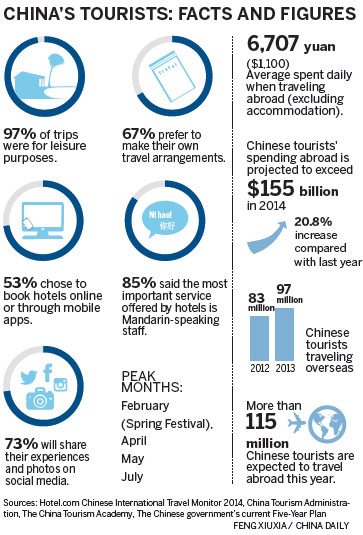A Chinese visitor celebrates with German friends at the famous Oktoberfest in Munich. Many countries and regions are looking for new ways to bring Chinese tourists, and their money, to their shores. Michaela Rehle / Reuters

An increasing number of countries are modifying their visa-application procedures in the hope of attracting more visitors from China, as Su Zhou and Zheng Xin report.
Many Beijing residents have just been given an unexpected six-day holiday to coincide with the Asia-Pacific Economic Cooperation summit being held in the Chinese capital in November. The surprise break has resulted in a boost for tourist agencies, and the big winners will be domestic tourism spots and countries that have loosened their visa-application procedures.

"The number of trips booked to countries with easier visa-application processes has risen sharply in the past few days," said Dai Yu, marketing director of the Tourism Department of Ctrip, an online travel service provider. "When we introduce our travel products, we recommend those countries because of the limited time on offer.
"Now Chinese tourists have a wider range of choices than before, so if they can have a great vacation in a country that doesn't require a visa at all, they won't bother to choose one where it takes days to obtain a permit," said Dai, who added that 49 countries and regions have visa-free or "visa-on-arrival policies" for Chinese citizens.
In 2012, China became the world's largest tourism source market - the World Tourism Organization calculates that Chinese expenditure on foreign travel hit $129 billion in 2013 - and is expected to overtake the United States as the world's largest travel and tourism economy in 2027.
Many countries are now scrambling to ease their visa-application procedures to attract more Chinese visitors and grab a larger slice of the pie.
According to a report released by the World Tourism Cities Federation and Ipsos in August, the top three visa-related problems Chinese outbound tourists experience are time-consuming application procedures, the strict requirements for obtaining visas, and exorbitant fees.
In recent months, many countries have introduced easier ways of obtaining visas, by speeding up the process, reducing the documentation required, opening more application centers, and providing longer term multi-entry visas for regular visitors, despite concerns about issues such as overstays, terrorism, and illegal immigration.
During Premier Li Keqiang's visit to Germany on Oct 10, Berlin announced that it would shorten the visa-application process to 48 hours - at present, it takes at least three to five working days - and, to cater to people from inland China, more visa application centers will be opened in those areas.
The Canada Tourism Bureau said it upgraded single-entry visas to multi-entry ones earlier this year, hoping to attract more Chinese visitors by making it easier for them to travel to the country. "The multi-entry visa will allow eligible visitors to stay in Canada for as long as six months per trip, and visa validity has been extended to a 10-year-maximum," according to a bureau spokesperson.
Charles Bennett, minister-counselor for consular affairs at the United States embassy in Beijing, said that in the last three years the embassy has taken steps to make visa applications simpler, more efficient, and less expensive. As a result, most applications have been processed within an average of five working days.
Preferential policies
Many other countries also operate preferential policies for Chinese tourists. Thailand waived visa fees for tourists from the Chinese mainland and Taiwan from August to October. The United Kingdom has introduced a "super priority" visa service in Beijing, Shanghai and Guangzhou under which Chinese citizens can obtain a visa within 24 hours of applying. Meanwhile, Italy has shortened its application process to 36 hours, and France has adopted a 48-hour service for Chinese tourists.
"As the whole world is competing to welcome Chinese tourists, governments are being more progressive in trying to come up with looser visa-application procedures," said Arne Sorenson, president and chief executive officer of Marriot International Inc, one of the world's leading hospitality companies.
Li Nan, visa services manager with German Industry and Commerce Greater China, said visa applications are the most fundamental issue countries have to consider in terms of tourism, and people will react very quickly to any changes that occur.
"I remember that there was a sharp rise in the number of Chinese applicants to Germany right after the country waived personal interviews at the embassy," she said.
Encouraged by the trend, Chinese travel agencies are planning to expand their overseas travel operations. Shan Xiaojun, head of the Outbound Tourism Visa Division at the online travel agency Lvmama, said the company has introduced a greater number of European travel products since August.
"In the past, we didn't have many tourists going to Europe because the process to obtain a visa was quite complicated. Correspondingly, we didn't provide a large number of products," Shan said. "But with Britain and France sending olive branches, we expect more visits to European countries than before."
Experts are convinced that more countries will ease their procedures, including e-visas instead of interviews, and that there will be increased reciprocity among nations to further eliminate visa barriers and facilitate ease of travel.
"Countries are left with no choice but to make it easier for Chinese people to get visas because they will opt for a different country if they have to wait for months for a visa," said Desiree Bollier, CEO of Value Retail Management, the creator and operator of Chic Outlet Shopping.
Yang Jinsong, a professor at the China Tourism Academy who researches international tourism, said: "No one wants to be left behind as China's economic pie is being carved up."
Dou Qun, a tourism industry professor at Beijing Union University, pointed out that Chinese tourists are the main growth engine for the overseas tourism market: "The overseas tourism market still needs time to recover from the financial crisis. The Chinese market is huge and has great potential. Every country has its eye on China.
"Second, compared with domestic tourists, the profit made from Chinese tourists is much higher," he added. "Take Europe for example. China is relatively far away, so the flight is longer. That means Chinese tourists tend to stay longer, and they shop more if they stay longer. All of this contributes more to local tourism and tourism-related industries. Taking all these factors into consideration, no country wants to turn down visa applications from Chinese tourists."
Contact the writers at suzhou@chinadaily.com.cn and zhengxin@chinadaily.com.cn
